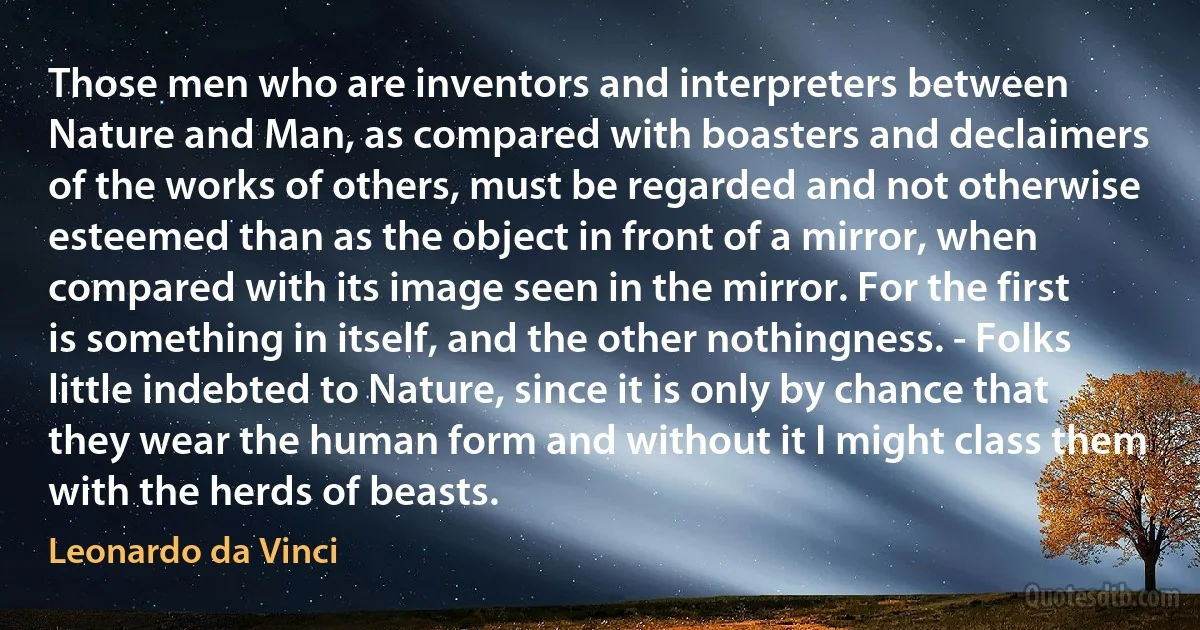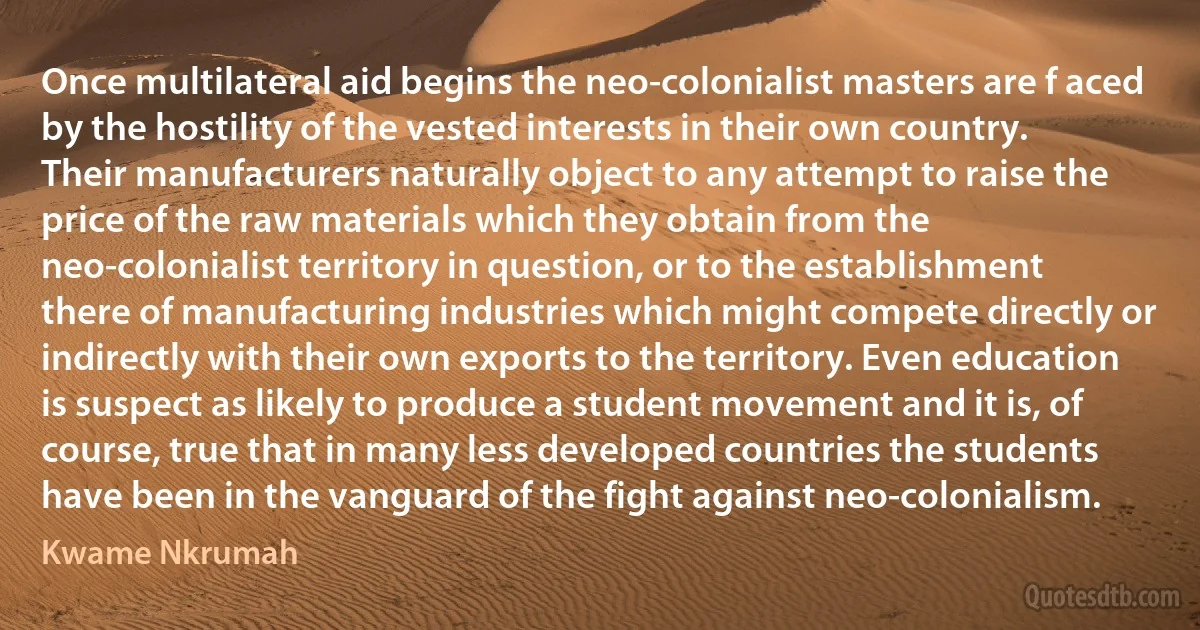Object Quotes - page 80
The body which is nearest to the light casts the largest shadow, and why? If an object placed in front of a single light is very close to it you will see that it casts a very large shadow on the opposite wall, and the farther you remove the object from the light the smaller will the image of the shadow become.

Leonardo da Vinci
The air is filled with endless images of the objects distributed in it; and all are represented in all, and all in one, and all in each, whence it happens that if two mirrors are placed in such a manner as to face each other exactly, the first will be reflected in the second and the second in the first. The first being reflected in the second takes to it the image of itself with all the images represented in it, among which is the image of the second mirror, and so, image within image, they go on to infinity in such a manner as that each mirror has within it a mirror, each smaller than the last and one inside the other. Thus, by this example, it is clearly proved that every object sends its image to every spot whence the object itself can be seen; and the converse: That the same object may receive in itself all the images of the objects that are in front of it.

Leonardo da Vinci
I am much too alone in this world, yet not alone enough
to truly consecrate the hour.
I am much too small in this world, yet not small enough
to be to you just object and thing,
dark and smart.
I want my free will and want it accompanying
the path which leads to action;
and want during times that beg questions,
where something is up,
to be among those in the know,
or else be alone.

Rainer Maria Rilke
The grand, leading principle, towards which every argument hitherto unfolded in these pages directly converges, is the absolute and essential importance of human development in its richest diversity; but national education, since at least it presupposes the selection and appointment of some one instructor, must always promote a definite form of development, however careful to avoid such an error. And hence it is attended with all those disadvantages which we before observed to flow from such a positive policy; and it only remains to be added, that every restriction becomes more directly fatal, when it operates on the moral part of our nature,-that if there is one thing more than another which absolutely requires free activity on the part of the individual, it is precisely education, whose object it is to develop the individual.

Wilhelm von Humboldt
Third, Communism attributes ultimate value to the state. Man is made for the state and not the state for man. One may object, saying that in Communist theory the state is an ‘interim reality,' which will ‘wither away' when the classless society emerges. True--in theory; but it is also true that, while it lasts, the state is the end. Man is a means to that end. Man has no inalienable rights. His only rights are derived from, and conferred by, the state. Under such a system, the fountain of freedom runs dry. Restricted are man's liberties of press and assembly, his freedom to vote, and his freedom to listen and to read. Art, religion, education, music, and science come under the gripping yoke of government control. Man must be a dutiful servant to the omnipotent state.

Martin Luther King Jr.
Every definition implies an axiom, since it asserts the existence of the object defined. The definition then will not be justified, from the purely logical point of view, until we have proved that it involves no contradiction either in its terms or with the truths previously admitted.

Henri Poincaré
Bloom, O ye Amaranths! bloom for whom ye may,
For me ye bloom not! Glide, rich streams, away!
With lips unbrightened, wreathless brow, I stroll:
And would you learn the spells that drowse my soul?
Work without Hope draws nectar in a sieve,
And Hope without an object cannot live.

Samuel Taylor Coleridge
I do not dispute the right of individuals to look to religion for a private moral compass, but I do object to the assumption of too many religious people that atheists live in a moral vacuum. Those of us who feel no need for a moral code written down in an ancient tome have, in my opinion, recourse to an innate moral intuition long ago shaped by natural selection promoting social cohesion in groups of our ancestors.

James D. Watson
We are in favour of the withering away of the state, and at the same time we stand for the strengthening of the dictatorship of the proletariat, which represents the most powerful and mighty of all forms of the state which have existed up to the present day. The highest development of the power of the state, with the object of preparing the conditions of the withering away of the state: that is the Marxist formula. Is it "contradictory"? Yes, it is "contradictory." But this contradiction is a living thing and wholly reflects the Marxist dialectic.

Joseph Stalin
Upon the subject of education, not presuming to dictate any plan or system respecting it, I can only say that I view it as the most important subject which we as a people can be engaged in. That every man may receive at least a moderate education, and thereby be enabled to read the histories of his own and other countries, by which he may duly appreciate the value of our free institutions, appears to be an object of vital importance, even on this account alone, to say nothing of the advantages and satisfaction to be derived from all being able to read the Scriptures, and other works both of a religious and moral nature, for themselves.

Abraham Lincoln
There is no grievance that is a fit object of redress by mob law. In any case that arises, as for instance, the promulgation of abolitionism, one of two positions is necessarily true; that is, the thing is right within itself, and therefore deserves the protection of all law and all good citizens; or, it is wrong, and therefore proper to be prohibited by legal enactments; and in neither case, is the interposition of mob law, either necessary, justifiable, or excusable.

Abraham Lincoln
The seceders insist that our Constitution admits of secession. They have assumed to make a national constitution of their own, in which of necessity they have either discarded or retained the right of secession, as they insist it exists in ours. If they have discarded it, they thereby admit that on principle it ought not to be in ours. If they have retained it, by their own construction of ours they show that to be consistent they must secede from one another whenever they shall find it the easiest way of settling their debts or effecting any other selfish or unjust object. The principle itself is one of disintegration, and upon which no government can possibly endure.

Abraham Lincoln
The new year of 1854 found slavery excluded from more than half the States by State constitutions, and from most of the national territory by congressional prohibition. Four days later commenced the struggle which ended in repealing that congressional prohibition. This opened all the national territory to slavery, and was the first point gained. But, so far, Congress only had acted; and an indorsement by the people, real or apparent, was indispensable to save the point already gained and give chance for more. This necessity had not been overlooked; but had been provided for, as well as might be, in the notable argument of "squatter sovereignty," otherwise called "sacred right of self government," which latter phrase, though expressive of the only rightful basis of any government, was so perverted in this attempted use of it as to amount to just this: That if any one man, choose to enslave another, no third man shall be allowed to object.

Abraham Lincoln
But it is quite easy to express the solution in words, thus: the plurality that we perceive is only an appearance; it is not real. Vedantic philosophy, in which this is a fundamental dogma, has sought to clarify it by a number of analogies, one of the most attractive being the many-faceted crystal which, while showing hundreds of little pictures of what is in reality a single existent object, does not really multiply the object...
'You may suddenly come to see, in a flash, the profound rightness of the basic conviction of Vedanta: ... knowledge, feeling and choice are essentially eternal and unchangeable and numerically one in all men, nay in all sentient beings.'

Erwin Schrödinger
The great thing however is, in the show of the temporal and the transient to recognize the substance which is immanent and the eternal which is present. For the work of Reason (which is synonymous with the Idea) when considered in its own actuality, is to simultaneously enter external existence and emerge with an infinite wealth of forms, phenomena and phases - a multiplicity that envelops its essential rational kernel with a motley outer rind with which our ordinary consciousness is earliest at home. It is this rind that the Concept must penetrate before Reason can find its own inward pulse and feel it still beating even in the outward phases. But this infinite variety of circumstances which is formed in this element of externality by the light of the rational essence shining in it - all this infinite material, with its regulatory laws - is not the object of philosophy....To comprehend what is, is the task of philosophy: and what is is Reason.

Georg Wilhelm Friedrich Hegel
In America, more than anywhere else, the individual is lost in the achievements of the many. America is beginning to be the world leader in a scientific investigation. American scholarship is both patient and inspiring. The Americans show an unselfish devotion to science, which is the very opposite of the conventional European view of your countrymen. Too many of us look upon Americans as dollar chasers. This is a cruel libel, even if it is reiterated thoughtlessly by the Americans themselves. It is not true that the dollar is an American fetish. The American student is not interested in dollars, not even in success as such, but in his task, the object of the search. It is his painstaking application to the study of the infinitely little and the infinitely large which accounts for his success in astronomy.

Albert Einstein
When the happiness or misery of others depends in any respect upon our conduct, we dare not, as self–love might suggest to us, prefer the interest of one to that of many. The man within immediately calls to us, that we value ourselves too much and other people too little, and that, by doing so, we render ourselves the proper object of the contempt and indignation of our brethren. Neither is this sentiment confined to men of extraordinary magnanimity and virtue. It is deeply impressed upon every tolerably good soldier, who feels that he would become the scorn of his companions, if he could be supposed capable of shrinking from danger, or of hesitating, either to expose or to throw away his life, when the good of the service required it.

Adam Smith
Now the object of the will, i.e., of man's appetite, is the universal good...Hence it is evident that nothing can lull the human will but the universal good. This is to be found, not in any creature, but in God alone; because every creature has goodness by participation. Thus God alone can satisfy the will of a human being.

Thomas Aquinas



